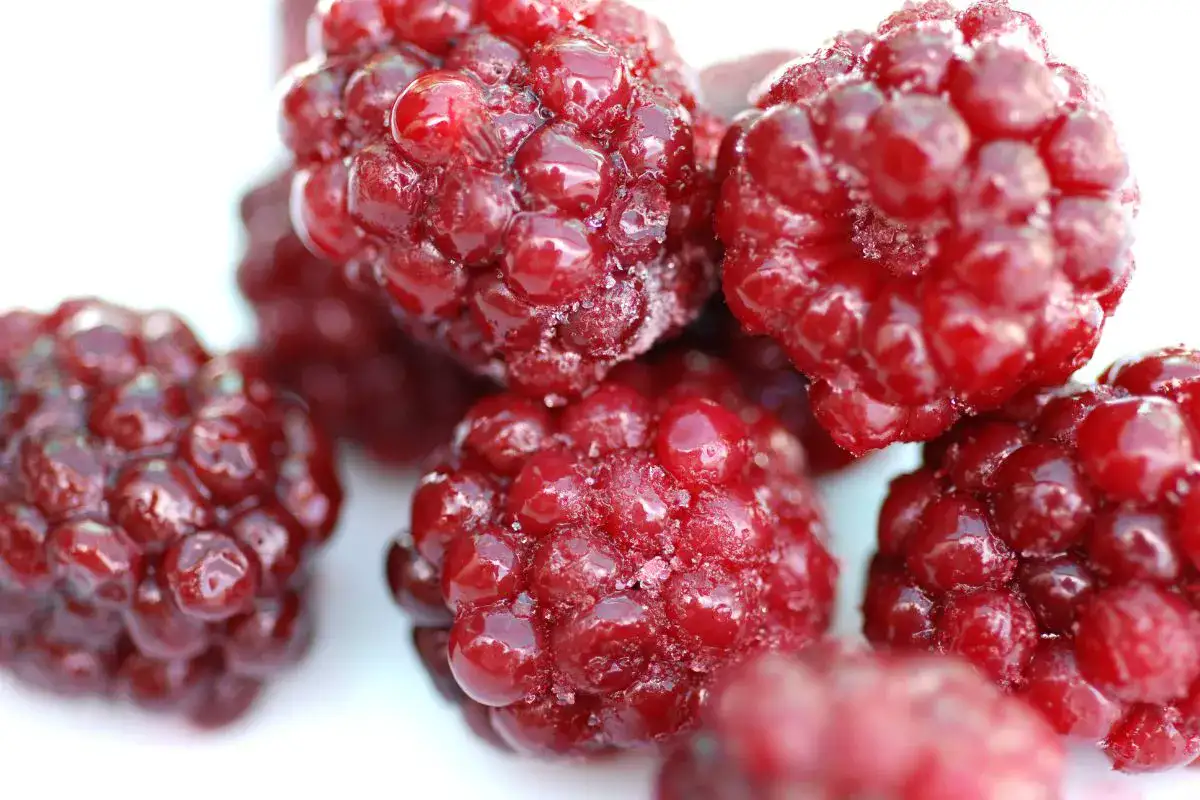Introduction and Basics
Introduction to Raspberries in Cooking and Baking
Raspberries, a beloved summer fruit, have long captured the hearts of food enthusiasts. Their vibrant color, tantalizing aroma, and balance of sweet and tart flavors make them a versatile ingredient. In cooking and baking, raspberries enrich an array of dishes, from decadent desserts to savory sauces. Their ability to blend with other ingredients, enhancing flavors and adding complexity, underscores their importance in culinary arts.
Importance of Raspberries in Various Dishes
Raspberries offer more than just a burst of flavor; they bring texture, color, and nutrition to dishes. Their application spans:
- Desserts: Pies, tarts, and cakes often feature raspberries for their fruity zest.
- Sauces and Compotes: They add depth to both sweet and savory sauces.
- Salads: Fresh raspberries provide a refreshing contrast in green salads.
- Drinks: From cocktails to smoothies, raspberries infuse beverages with their signature flavor.
Fresh vs. Frozen Debate Overview
The debate between using fresh vs. frozen raspberries is a topic of discussion among cooks and bakers. Both forms have their merits and applications in the kitchen, which we will explore:
- Fresh Raspberries: Celebrated for their natural sweetness and texture. Ideal for dishes where their appearance is paramount.
- Frozen Raspberries: Offer consistency in flavor and are available year-round. Best suited for cooked or baked dishes where texture is less critical.
Understanding the nuances between fresh and frozen raspberries can empower home cooks and professional chefs alike to make informed decisions based on the needs of their recipes.
Understanding Frozen Raspberries
How Raspberries are Frozen (Flash-Freezing Process)
The journey of raspberries from the bush to the freezer is fascinating and crucial for preserving their quality. The process, known as flash-freezing, ensures that raspberries retain their taste, nutritional value, and texture. Here’s how it works:
- Harvesting: Raspberries are picked at peak ripeness, ensuring they’re bursting with flavor.
- Cleaning: They’re gently washed to remove any dirt or impurities.
- Flash-Freezing: Raspberries are spread out and frozen quickly at extremely low temperatures. This rapid process prevents the formation of large ice crystals, which can damage cell structure and affect texture.
- Packaging: Once frozen, raspberries are packed and sealed to keep moisture out and maintain freshness.
This method of freezing raspberries not only extends their shelf life but also preserves their quality, making them a reliable alternative to fresh raspberries.

Nutritional Differences Between Fresh and Frozen Raspberries
When considering frozen raspberries vs. fresh, one might wonder if there’s a significant difference in their nutritional content. The truth is, the differences are minimal. Here’s what research and studies show:
- Vitamins and Minerals: Frozen raspberries retain most of their vitamins and minerals. In some cases, the freezing process can even preserve certain nutrients more effectively than fresh berries stored for several days.
- Antioxidants: Raspberries are rich in antioxidants, which are crucial for fighting free radicals. Frozen raspberries maintain high levels of antioxidants, similar to fresh ones.
- Fiber and Sugar: The fiber content remains unchanged in frozen raspberries, making them equally beneficial for digestion. Sugar levels also stay consistent, preserving their natural sweetness.
By understanding these aspects, it’s clear that frozen raspberries are a nutritious and convenient option, offering a viable alternative to fresh raspberries without significant nutritional compromise.
Benefits of Using Frozen Raspberries
Availability Year-Round
One of the most compelling reasons to opt for frozen raspberries is their year-round availability. Unlike fresh raspberries, which are seasonal and often only at their best for a short period:
- Seasonal Independence: Frozen raspberries break free from the constraints of seasons, offering the taste of summer even in the coldest months.
- Consistent Quality: They maintain a consistent level of quality, regardless of the time of year, ensuring that every dish can have the vibrant flavor of raspberries without compromise.
This availability supports culinary creativity and ensures that raspberries can be a staple in diets regardless of the season.
Cost-Effectiveness
When considering the cost-effectiveness of frozen raspberries compared to their fresh counterparts, several factors come into play:
- Longer Shelf Life: Frozen raspberries have a significantly longer shelf life, reducing waste and saving money over time.
- Bulk Purchasing: The ability to buy in bulk often means lower prices, making frozen raspberries a budget-friendly option for many households.
- Reduced Transportation Costs: Since they can be stored and transported more efficiently than fresh raspberries, frozen ones often have a lower overall cost, making them an economical choice for consumers.
Convenience in Storage and Usage
The convenience factor of frozen raspberries cannot be overstated. Their ease of storage and usage makes them a practical choice for both quick meals and elaborate recipes:
- Easy Storage: Frozen raspberries can be kept in the freezer for months without losing their quality, making them a convenient staple to have on hand.
- Readiness to Use: They are pre-washed and ready to use straight from the freezer, saving time in meal preparation.
- Versatility: Frozen raspberries can be used in a variety of dishes, from smoothies to sauces to baked goods, without the need for defrosting, offering unparalleled convenience in the kitchen.
Using Frozen Raspberries in Recipes
When incorporating frozen raspberries into your culinary creations, understanding the adjustments required for their excess moisture, knowing when to thaw them versus using them straight from the freezer, and identifying the ideal types of recipes for their use are crucial. This comprehensive approach ensures that your dishes retain the vibrant flavor and nutritional benefits of raspberries, making your recipes a delightful experience.

Adjustments for Excess Moisture
Frozen raspberries tend to release more moisture than fresh ones upon thawing. This characteristic requires adjustments in recipes to maintain the desired consistency and texture of the final dish. For baked goods, consider reducing the amount of liquid ingredients slightly or adding a bit more flour to compensate for the extra moisture. This strategy helps in achieving the perfect bake without compromising the structure of cakes, muffins, or pastries.
- Tip: Dusting frozen raspberries with a small amount of flour before adding them to batters can also help in minimizing the bleeding of juices, keeping the raspberries more intact and distributing them evenly throughout the dish.
When to Thaw vs. Use Straight from the Freezer
Deciding whether to thaw frozen raspberries or use them directly from the freezer depends on the type of recipe you’re preparing.
- For smoothies or sauces, using frozen raspberries straight from the freezer is ideal, as their cold temperature contributes to a thicker consistency and retains the fresh, tangy flavor of the berries.
- In baking, you might opt for either approach: using them frozen to prevent the raspberries from becoming too mushy and bleeding into the batter, or thawing them if the recipe calls for a puree.
Understanding these nuances ensures that frozen raspberries can seamlessly replace fresh ones in your culinary repertoire.
Ideal Types of Recipes for Frozen Raspberries
Frozen raspberries are incredibly versatile, making them suitable for a wide range of recipes. Their rich flavor and nutritional profile can enhance both sweet and savory dishes. Here are some ideal recipe types where frozen raspberries shine:
- Baked Goods: From muffins to cakes, frozen raspberries add a burst of flavor and moisture.
- Smoothies: Frozen raspberries provide a cold, refreshing base for smoothies, enriching them with vitamins and antioxidants without the need for ice.
- Sauces and Compotes: When cooked down, frozen raspberries create rich, flavorful sauces perfect for drizzling over desserts or savory dishes.
By incorporating these insights into your cooking and baking practices, you can confidently use frozen raspberries in a myriad of recipes, from delicious raspberry-infused baked goods to refreshing smoothies and vibrant sauces. Whether you’re looking to replicate the fresh taste of summer or simply enjoy raspberries year-round, frozen raspberries offer a convenient and flavorful alternative to their fresh counterparts, proving that they can indeed be used instead of fresh in various culinary applications.
Quality and Safety Considerations
Ensuring the quality and safety of frozen raspberries is paramount for their use in various culinary applications. From selecting high-quality berries to understanding the signs of spoilage or freezer burn, these considerations help maintain the freshness and nutritional value of raspberries, affirming their suitability as a substitute for fresh ones in recipes.
How to Select High-Quality Frozen Raspberries
Selecting high-quality frozen raspberries starts with examining the packaging. Opt for raspberries that are packed in tight, undamaged bags or containers. This minimizes the risk of freezer burn, a common issue that affects taste and texture. Additionally, look for berries that are individually frozen, indicating they were fresh and ripe at the time of freezing. Avoid packages with ice crystals or raspberries clumped together, as these are signs of thawing and refreezing, which can compromise quality.
- Expert Tip: For comprehensive safety tips on handling produce, the U.S. Food and Drug Administration provides valuable guidelines on selecting and serving produce safely.
Storage Tips to Maintain Freshness
Proper storage is crucial for maintaining the freshness of frozen raspberries. Once you bring them home, ensure they are stored in the freezer immediately. The ideal freezer temperature is 0°F (-18°C) or lower to keep the raspberries in prime condition. If you’ve opened the package, transfer the remaining raspberries to an airtight container or a freezer-safe bag to prevent freezer burn and odor absorption from other foods.
- Learn More: Discover detailed instructions on how to store fresh picked raspberries to keep them fresh and delicious longer with expert tips.
Signs of Spoilage or Freezer Burn
Being able to identify signs of spoilage or freezer burn is essential when using frozen raspberries. Spoilage can manifest as mold or a fermented smell, indicating that the raspberries are no longer safe to consume. On the other hand, freezer burn appears as white, dried-out patches on the raspberries, resulting from air reaching the berries. While freezer-burned raspberries are safe to eat, they may have a dry texture and diminished flavor, making them less desirable for some recipes.
- For recipes requiring high-quality raspberries, it’s best to use berries without signs of freezer burn.
- Frozen raspberries showing signs of spoilage should be discarded to avoid health risks.
By adhering to these quality and safety considerations, you can confidently incorporate frozen raspberries into your cooking and baking endeavors, ensuring delicious and safe outcomes. Whether you’re making smoothies, baked goods, or sauces, understanding how to select, store, and assess frozen raspberries enhances the overall quality of your dishes, proving that they can indeed be used as a viable alternative to fresh raspberries.
FAQ: Using Frozen Raspberries
Can frozen raspberries replace fresh in any recipe?
- Frozen raspberries can replace fresh in most recipes, especially in cooked or baked dishes where texture is less critical. However, for recipes requiring the aesthetic appeal and firm texture of fresh berries, such as fresh salads or garnishes, frozen raspberries might not be the best substitute.
Do frozen raspberries need to be washed before use?
- Generally, frozen raspberries do not require washing before use. They are typically cleaned before the freezing process. Thawing and washing can make them mushy, so it’s best to use them directly from the freezer, especially in cooking or baking.
How do the flavors compare between fresh and frozen raspberries?
- The flavor of frozen raspberries is remarkably similar to that of fresh raspberries, though some subtle differences might be noticed due to the freezing process. Frozen raspberries can sometimes have a slightly less vibrant flavor, but they still offer a delicious and convenient alternative, especially out of season.
Can I freeze fresh raspberries at home?
- Yes, you can freeze fresh raspberries at home using the flash-freezing technique:
- Wash and dry the raspberries gently.
- Spread them out on a baking sheet in a single layer, ensuring they’re not touching.
- Freeze until solid, then transfer to airtight containers or freezer bags.
- This method helps maintain their shape and texture as much as possible.
How long can I store frozen raspberries?
- Frozen raspberries can be stored in the freezer for up to 12 months without significant loss of quality. However, for the best flavor and texture, it’s recommended to use them within 6 to 8 months.
Conclusion
When debating “Can frozen raspberries be used instead of fresh?”, several key points emerge. The choice between fresh and frozen raspberries largely depends on personal preference and the specific requirements of a recipe. Fresh raspberries offer a vibrant, tender texture perfect for fresh applications, like salads and garnishes, where their visual appeal and texture play a central role. On the other hand, frozen raspberries provide a versatile, year-round option for those looking to enjoy this fruit’s flavor regardless of the season. They are particularly suited for baked goods, smoothies, and cooked dishes where the berry’s form becomes less critical after preparation.
The nutritional value remains relatively unchanged between fresh and frozen varieties, making frozen raspberries a nutritious alternative to their fresh counterparts. Cost-effectiveness, convenience, and availability further tilt the scale in favor of frozen raspberries, especially when out of season or when looking to reduce food waste.
Ultimately, whether one opts for fresh or frozen raspberries boils down to the specific needs of the dish at hand and the individual’s taste preferences. Both forms of raspberries hold their unique charm and benefits, catering to different culinary needs and moments.

